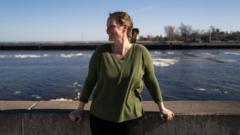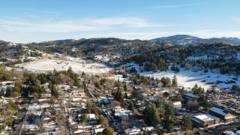Recent wildfires in Los Angeles have prompted a growing number of Californians to leave for "climate havens" that are thought to be less vulnerable to climate-related disasters. Experts predict that the increasing frequency and severity of such disasters could lead to more widespread migration from the state.
Californians Seek Refuge in 'Climate Havens' Amid Escalating Wildfires

Californians Seek Refuge in 'Climate Havens' Amid Escalating Wildfires
As wildfires devastate Los Angeles, many Californians are relocating to areas deemed safer due to climate change.
Amid the backdrop of catastrophic wildfires sweeping through Los Angeles, Californians are increasingly seeking refuge in so-called "climate havens." Recent events saw over 150,000 residents evacuate as flames encroached on their homes, instigating fear reminiscent of previous wildfires that have plagued the state.
Christina Welch, who fled California after experiencing the devastating Tubbs fire of 2017, recounts how an impending wildfire pushed her to leave her Santa Rosa home for Duluth, Minnesota. For her, recurring episodes of extreme wildfires have taken a toll on her peace of mind. "There's only so many times that I was going to go through every fall worrying about what is going to set on fire," Welch admits.
While experts explain that mass migration due to climate change is not yet widespread, they acknowledge a troubling trend. The state’s population growth has seen a decline since 2000, with climate change posing mounting challenges, including flooding and earthquake risk. At the same time, rising insurance costs have left many residents without home insurance, prompting some to consider starting anew in other regions.
Cities like Duluth, identified as a "climate haven," are witnessing a surge of new residents drawn by their promise of climate stability. However, even these locations face challenges as they prepare for an influx of climate migrants. Despite available space for housing, Duluth grapples with limited development and rising home prices.
Yet, as exemplified by relocated Californians like Jamie Beck Alexander and Kelsey Lahr, the concept of a safe haven may be illusory. Lahr, who moved to Asheville, North Carolina, fell victim to unexpected natural disasters highlighting the universal nature of climate risk. "I sort of increasingly think that climate havens are a myth," she states, illustrating the reality that no place is entirely immune to climate change.
Experts urge cities marked as climate refuges to gear up for potential migration, emphasizing the need for robust planning. "We have to start preparing for those eventualities, because they're going to become more frequent and more extreme," warns Derek Van Berkel, an academic closely studying climate implications.
As the climate crisis intensifies, residents are left to ponder the effectiveness of their choices in seeking security while grappling with the very real threats posed by environmental change. For many, leaving California is a decision forged in the furnace of need, not merely a preference.



















